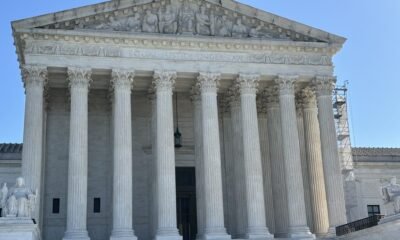arizona
Federal Judge Halts Trump’s Funding Freeze on Grants and Loans

A federal district judge has granted a temporary restraining order that prevents the Trump administration from implementing a proposed freeze on federal grants and loans. Chief Judge John J. McConnell Jr. of the U.S. District Court in Rhode Island stated that the administration’s actions violate established laws and constitutional provisions.
In a detailed 13-page ruling, McConnell highlighted the requirement for the Executive Branch to seek Congressional approval if it believes appropriations contradict presidential priorities. He emphasized that, under the Impoundment Control Act of 1974, the President must formally request Congress to rescind appropriated funds, a procedure the administration has seemingly disregarded.
The legal challenge was initiated by Democratic attorneys general from 22 states and the District of Columbia. This lawsuit was prompted by a two-page memo from the Office of Management and Budget (OMB), issued earlier in the week, which suggested a freeze on federal funding, causing significant uncertainty regarding the implications for various programs.
While the OMB memo explicitly stated that Social Security and Medicare would not be affected, it left questions unanswered about Medicaid and numerous federal programs that support veterans, schools, and food assistance. Adding to the concern, another document released by the OMB identified thousands of programs that would have been impacted by the original memo.
In a related development, District Judge Loren L. AliKhan of the U.S. District Court for the District of Columbia issued a short-term stay against the memo just two days prior to McConnell’s ruling, in response to a separate lawsuit by advocacy groups including the National Council of Nonprofits.
Subsequently, the Trump administration rescinded the OMB memo, a move the White House press secretary, Karoline Leavitt, clarified was not a withdrawal of the federal funding freeze. “It is simply a rescission of the OMB memo,” Leavitt stated, indicating that the President’s executive orders concerning federal funding remain effective.
Judge McConnell noted Leavitt’s comments in his order, stressing that the issues associated with the states’ motion for temporary relief were not moot due to the administration’s actions. He reinforced that the Executive’s assertion of aligning federal spending with presidential priorities is constitutionally flawed and emphasized that congressional appropriations must dictate federal funding actions.
According to the U.S. Constitution, Congress holds the authority to regulate federal spending, which has historically included mandatory funding for essential programs like Medicare, Medicaid, and Social Security, as well as discretionary funding for numerous federal departments.
McConnell pointed out that the OMB’s initial directive would have significantly disrupted state operations, as it allowed for less than 24 hours’ notice regarding the funding pause. This short timeframe prevented states from effectively planning for the potential loss of federal funds, which contradicts congressional intent and is seen as arbitrary and unjustified.
The lawsuit involves attorneys general from various states including New York, Arizona, California, and others, underscoring a significant legal battle over federal funding authority and its implications for state governance.


















